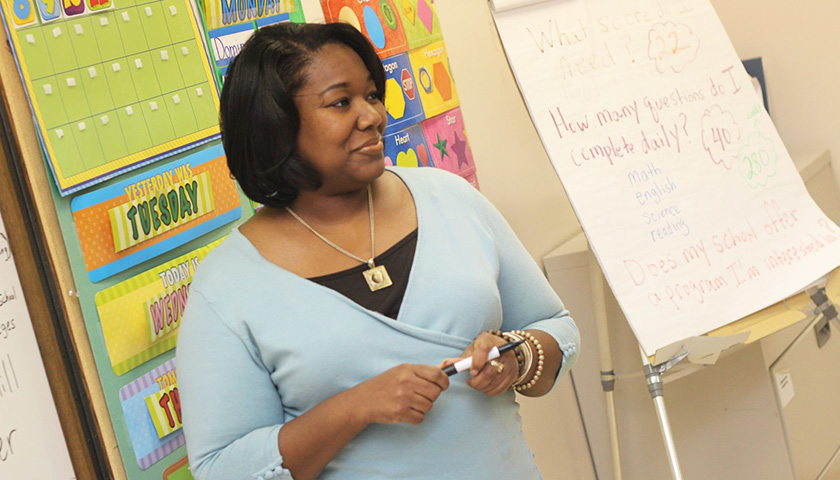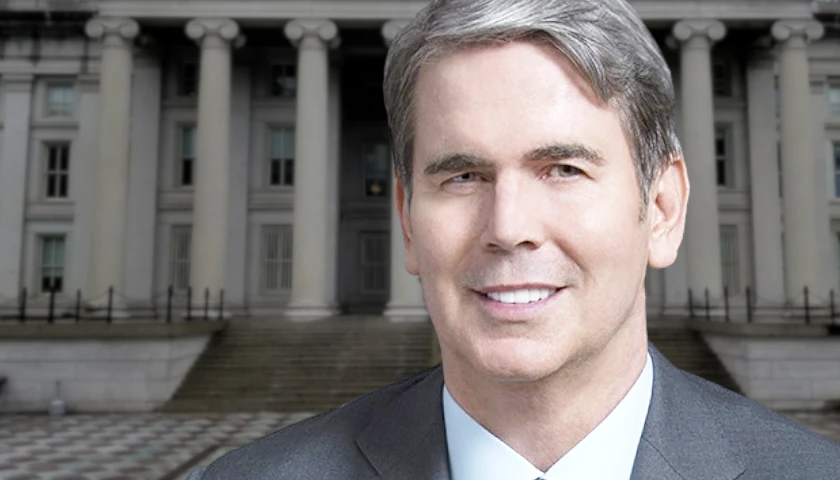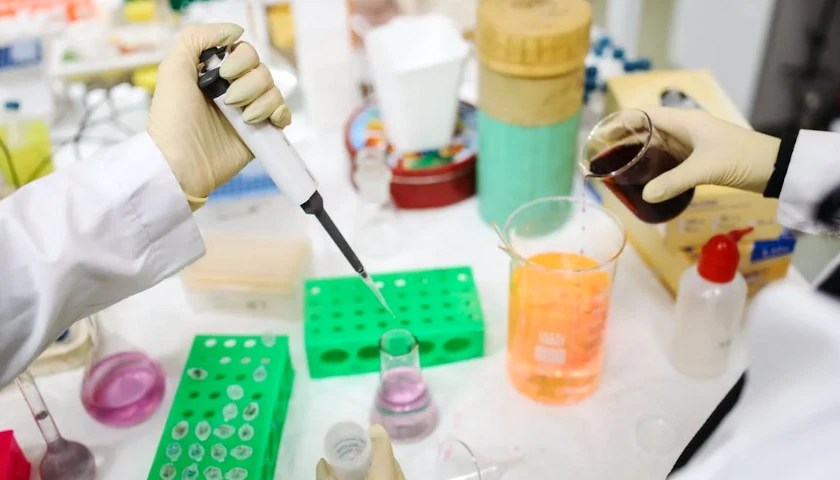The White House Initiative on Advancing Educational Equity, Excellence, and Economic Opportunity for Black Americans is featuring a “roundtable” event that seeks to promote K-12 public school systems that recruit and retain black teachers.
The invitation for the event, scheduled for Tuesday, August 23, says “B.L.A.C.K. to School” seeks to support “Black school, district, and state educational leaders and creating K12 systems that effectively recruit and retain Black teachers.”
The event comes as the Department of Education also announces $8 million in new grants to incentivize colleges to increase the number of teachers of color in their workforces.
“We know that teachers of color benefit not only students of color, but all students,” said U.S. Secretary of Education Miguel Cardona. “When students of color can see their backgrounds and experiences reflected in their teachers, we see higher levels of student achievement and engagement in school, and more students aspiring to be teachers themselves one day.”
News: ED has released its inaugural equity action plan, aligning with @POTUS’s executive order to advance racial equity & support underserved communities through the federal government. https://t.co/VcyQZ0Yxpz [🧵 1/4] pic.twitter.com/YfV94cg4zh
— U.S. Department of Education (@usedgov) April 14, 2022
The Department said America’s “teacher workforce” does not reflect “the demographics of the nation’s public school students”:
More than 50% of public school students are students of color, yet in 2017-18, the most recent year for which data were available, only 21% of teachers were teachers of color. And while English learners are the fastest growing public school student demographic, comprising more than 10% of America’s enrollment, most states face a shortage of bilingual and multilingual teachers prepared and qualified to teach this population and foreign languages. These roles are critical for ensuring Americans can compete in the increasingly globalized economy, equal access to education opportunity for English Learners, and the creation of a strong economy in which all Americans can thrive.
The department’s competitive grant program will provide funds for “applicants that propose projects designed to increase the number of well-prepared teachers from diverse backgrounds, as well as bilingual and multilingual teachers with full certification.”
In October, Joe Biden issued an executive order establishing a “White House Initiative on Advancing Educational Equity, Excellence, and Economic Opportunity for Black Americans.”
The initiative is chaired by Cardona, with Alexis K. Holmes, a former top official with the National Education Association, the nation’s largest teachers union, serving as executive director.
In his remarks announcing the executive order, Biden said that despite the progress black Americans have made throughout American history, “entrenched disparities continue to plague America’s education system, holding far too many Black students back from achieving their full potential.”
Biden said systemic racism is the reason for the academic failure of many black students.
“Because of persistent racial and systemic injustices in our Nation, Black students remain more likely to attend high-poverty and racially segregated schools than White students,” Biden continued, adding:
Black students are inequitably disciplined and suspended from school at disproportionately higher rates than White students for similar offenses. In addition, Black students too often face limited access to advanced and college-preparatory courses. Systemic racial disparities in education negatively impact learning outcomes for Black students and many face persistent gaps in reading and mathematics achievement. Studies show that school districts with high concentrations of Black students are much more likely to be underfunded than districts where a majority of students are White, and face much wider funding gaps, with an average deficit of more than $5,000 per student. Black students are still below the national average for educational attainment in high school, and that gap is even higher for college attainment rates, as 26 percent of Black Americans ages 25 and older have attained a bachelor’s degree, while the national average is 36 percent.
“Black students also face unique challenges at the intersection of race and gender,” Biden said further. “Barriers to equity in education can compound for Black students who are also LGBTQ+ students, English-language learners, Dreamers, or students with disabilities.”
Raising the Unity #Pride flag above ED headquarters for #PrideMonth is more than just a way to honor the #LGBTQI+ community – as Deputy Secretary Cindy Marten shares, it’s a representation of ED’s ongoing commitment to ensure equity for all students. #Pride2022 pic.twitter.com/7PMUUQLhm0
— U.S. Department of Education (@usedgov) June 13, 2022
Biden said among the goals of his initiative are “ensuring that all Black students have access to excellent teachers, school leaders, and other professionals, including by supporting efforts to improve the recruitment, preparation, development, and retention of qualified, diverse teachers and school leaders and other professionals who understand students’ lived experiences and can effectively meet their learning, social, and emotional needs.”
The initiative’s website states “African American students continue to lack equal access to a high quality education and still lag far behind their white peers in reading and math proficiency, high school rates, and college completion.”
Study Reaffirms Children from Stable, Married Families Have Greater Chance of Academic Success https://t.co/sSRPvA1PeGhttps://t.co/sSRPvA1PeG
— The Star News Network (@TheStarNewsNet) August 19, 2022
However, in a recent op-ed at the New York Post, Kendall Qualls, president of TakeCharge Minnesota, wrote it is not “racial and systemic injustices” that have led to academic failure for many black children, but “fatherless homes and low expectations.”
Qualls, who was a Republican candidate for Minnesota governor this year, lived in poverty throughout his childhood, from the “gang-and-drug-infested housing projects of late 1960s Harlem,” to “a trailer park in Oklahoma.”
“By the grace of God, I escaped that life, got an education, married and raised five children — now aged 18 to 28 — who are serving their communities,” he noted, adding:
Black families were stronger during the worst periods of American history than they are today. Since 1968, there has been a fourfold increase in the number of unmarried parents, according to Pew Research. But Census data show this trend especially applies to black families: In 2020, just 41.3% of black kids were growing up in a two-parent home, compared to 78.6% of white kids. Most black kids today can’t remember a time when black marriage was the norm. And with the influence of the black church waning, there is little moral authority to reverse this trend, a phenomenon I call “cultural genocide.”
Read @TakeChargeMN President @KendallQuallsMN Op Ed in today’s @nypost : https://t.co/1UZu9TIfK4 pic.twitter.com/tln3Xug17E
— TakeCharge (@TakeChargeUS) July 30, 2022
Qualls’ organization produced the documentary I Am a Victor which counters the Biden administration narrative that blacks are perennial victims of white oppression.
“As we see it, the promise of America is available to anyone, regardless of race or social standing,” Qualls wrote. “We are not victims.”
“In my lifetime, we’ve gone from 80% two parent families in the black community to 80% fatherless homes. That is the number one driver of disparities across our country.” – Kendall Qualls on @SidelineSanity with @Michele_Tafoya , 7/27/2022. Listen here: https://t.co/AHoSNHRhQ3 pic.twitter.com/ugBy7c3uTc
— TakeCharge (@TakeChargeUS) July 29, 2022
Qualls said raising education expectations for black children and restoring fathers in their homes are key to making positive change for them and the black community at large.
“Let’s stop buying the victim narrative and restore our families and communities,” he urged. “We’ll all be better off for it.”
– – –
Susan Berry, PhD is national education editor at The Star News Network. Email tips to [email protected].
Photo “Teacher” by nappy.




